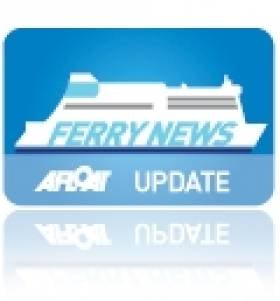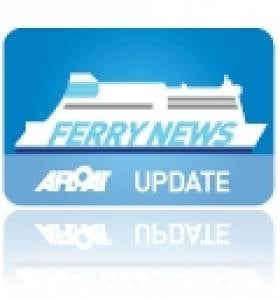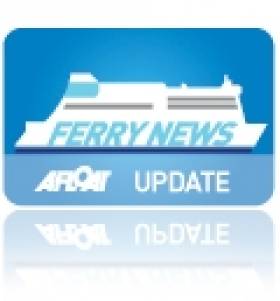Displaying items by tag: Wind Perfection
Former Fastnet Ferry Bids Farewell
#FASTNET FERRY – The ferry Julia (1981/22.161grt) which had operated the Fastnet Line Cork-Swansea service, set sail yesterday under her new name Wind Perfection, writes Jehan Ashmore.
Since the route closed in November last year (having only started in 2010) the German built ferry has been tied-up close to the city-centre in Cork. The ferry awaited an uncertain future after her co-operative owners failed to secure funds of €1m plus to maintain trading on the Celtic Sea.
Earlier this year she was sold to Dutch based C-Bed N.V. who are to re-fit the vessel, believed to be carried out in a shipyard in Denmark. The 1,860 passenger capacity ship is to be adapted for a new career as a floating dormitory for Siemens in the North Sea.
The vessel will be anchored at sea from where personnel working in the construction and servicing of offshore wind-farm turbine installations will be based.
Wind Perfection will join C-Bed's fleet which is also made up of two former ferries, one of which the Wind Ambition had also served Siemens while working at an offshore wind project in the Irish Sea.
Winds of Change face former Fastnet Ferry and Sistership
#FERRY NEWS - With the acquisition of Fastnet Line's Julia to C-BED as previously reported, the Dutch owned company's fleet rises to three floating hotels which are used to accommodate workers in offshore wind-farm energy installations, writes Jehan Ashmore.
All three vessels are former ferries and one of which the Wind Ambition was in recent years based in in the north Irish Sea. The third vessel is Wind Solution, for photos and technicl details of these vessels click HERE. While the former Cork-Swansea ferry has been renamed Wind Perfection (1981/22,161grt) , she remains berthed in Cork city docks having laid-up there since the route's closure last November.
The vessel is however due to undergo an extensive refit in The Netherlands before she takes up a charter in the North Sea with Siemens in October, as a floating hotel for wind-turbine industry employees.
By using the vessel Siemens are to save valuable time and money which would otherwise by the daily transfer of construction workers to and from the mainland. For a video computer simulation showing the different logistics involved between an offshore floating hotel and a conventional hotel onshore, click HERE.
Wind Perfection was originally built as Olau Britannia and shared sailings with sistership Olau Hollandia for a UK-Dutch route between Sheerness-Vlissingen operated by Olau Line.
The sisters were replaced by newer vessels on the North Sea route in the late 1980's and sold to various owners during the years. Before Julia made her Celtic Sea debut, she last ran under the same name for Stella Line on the St. Petersberg-Helsinki route.
Incidentally her sister Norlandia (1981/21,473grt) operates also from the Finnish capital to Tallinn for Eckero Line. Likewise she too is due to undergo changes as she is to be replaced later this year as a second-hand ferry from Mediterranean owners was sold to the Baltic Sea operator.
- Ferry news
- Fastnet Line
- CBed
- Celtic Sea ferry operator Fastnet Line
- Olau Line
- Julia
- Olau Britannia
- Olau Hollandia
- CorkSwansea
- Stella Lines
- Siemens
- Ports and Shipping News
- Irish Sea ferry news
- Eckero Line
- Nordlandia
- HelsinkiTallinn
- Wind Perfection
- Wind Ambition
- Wind Solution
- Offshore Floating Hotels
- WindFarm Instalations
- North Sea windfarms
Former Fastnet Ferry to Become Floating Hotel
#FERRY NEWS – The former Fastnet Line ferry Julia (1981 / 22,161grt) is to embark on a new life as a floating dormitory for workers building and servicing offshore wind turbines in the North Sea, according to The Examiner.
The rather ignominious end for the ferry once billed as one of the jewels in Cork tourism industry, marks the final chapter in the short and troubled life of Fastnet Line, which was set up by West Cork Tourism Co-operative.
At over 30 years-old the ship, which had capacity for 1,860 passengers, made its maiden voyage on the Cork-Swansea route in March 2010. She was bedevilled by mechanical problems in the first few days of operation, and in late 2011 the Celtic Sea service was withdrawn due to higher-than-expected fuel prices.
It had been hoped to restart the route this year, but Fastnet Line went into receivership last month. The vessel had been sold, reportedly for €5m, to C-BED, a Dutch-based company which are to rename her Wind Perfection.
For more on this story about the short-lived ferry operation click HERE.


























































